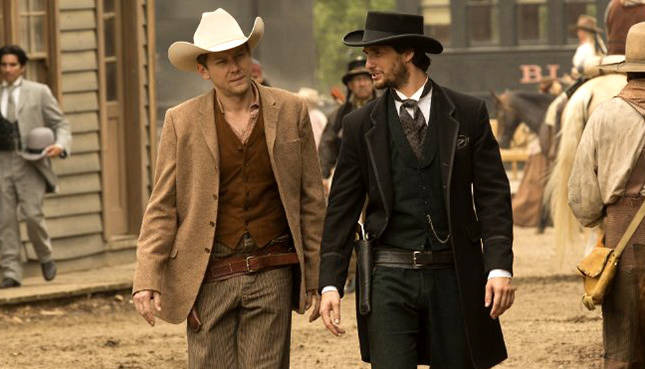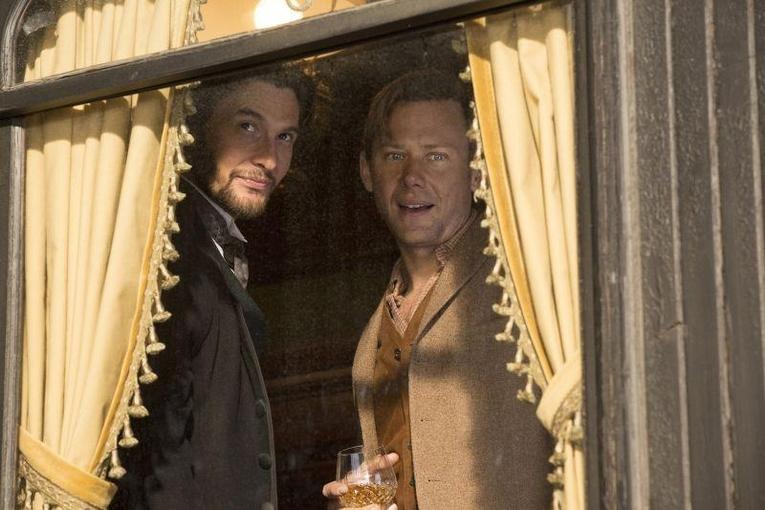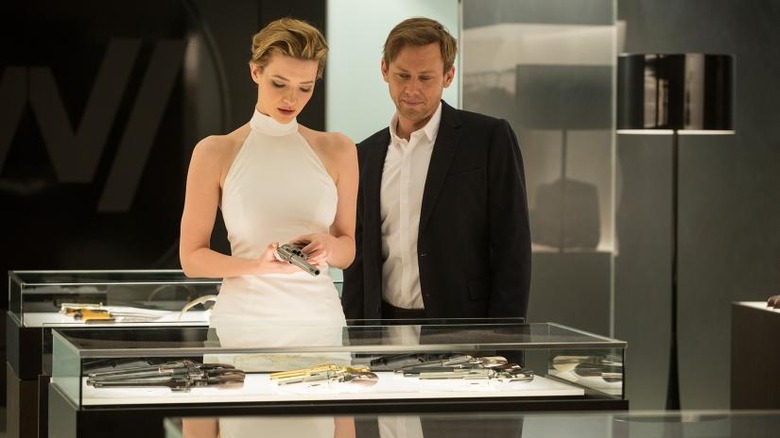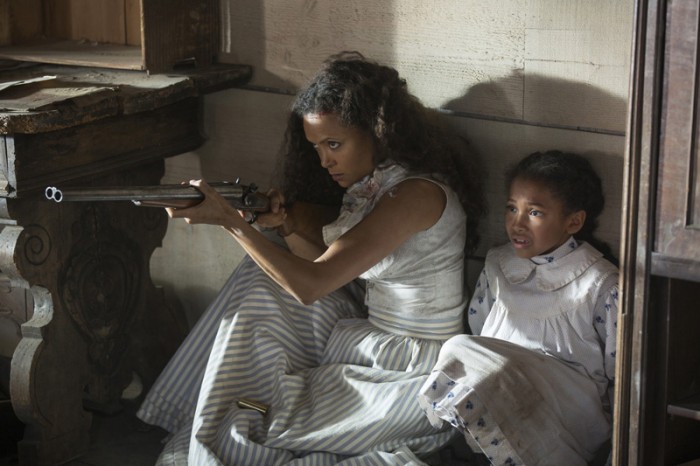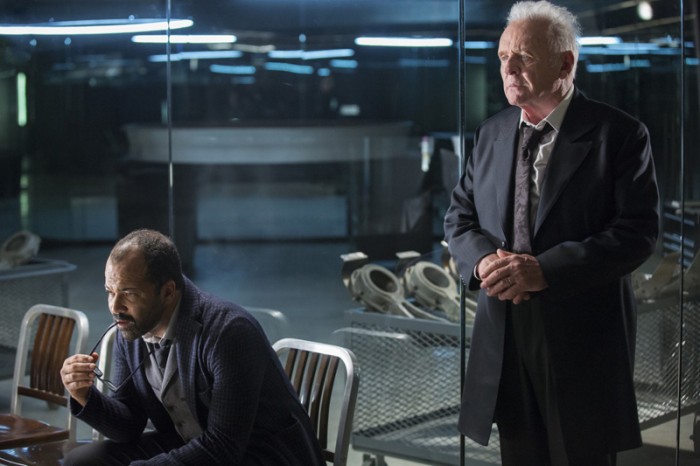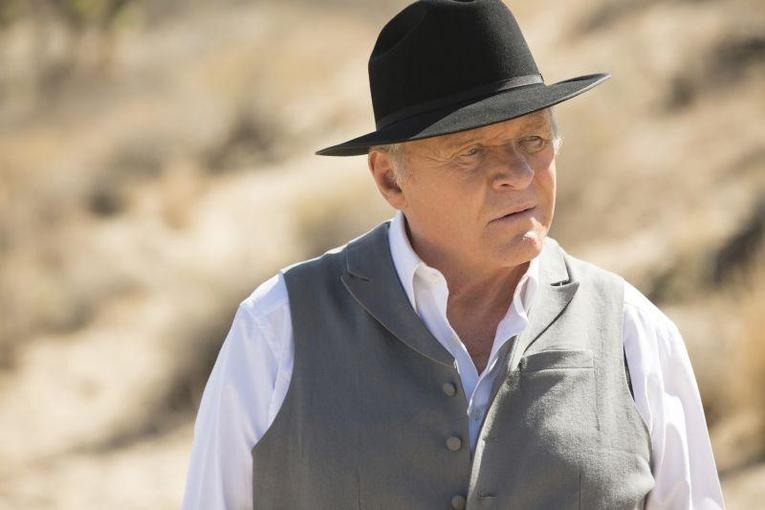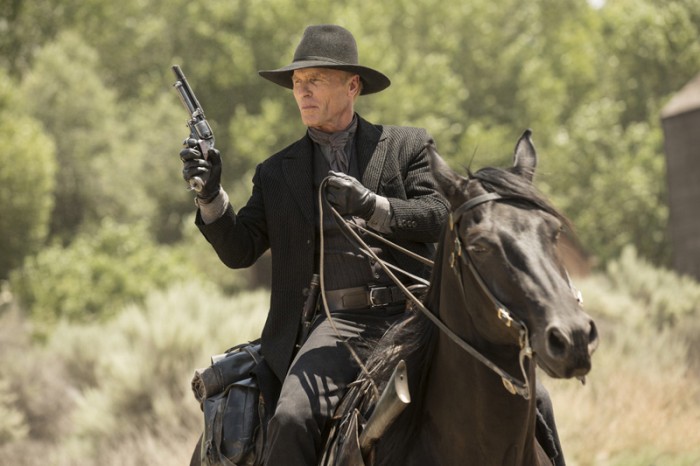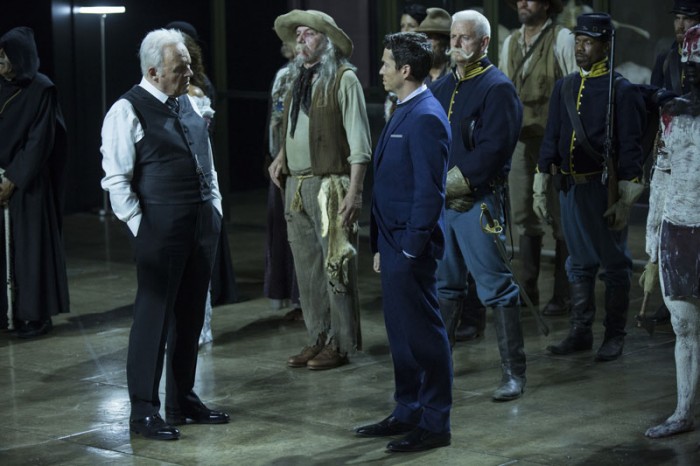'Westworld' Spoiler Review: 10 Questions From "Chestnut"
Few hours of television have given me as much to think about and dwell over as "Chestnut," the second episode of Westworld. No fancy introductions to this one. Let's just dive right in.
Are We Asking the Right Questions About Westworld?
The first episode of Westworld was one of HBO's biggest series debuts in years and television fans (many of them looking to fill the spot in their heart temporarily vacated by Game of Thrones) have flocked to it. After only one hour, critics and real people across the internet were digging into the show, discussing its subtleties, exploring its mysteries, and generally giving it the kind of obsessive attention we usually reserve for shows that have been on the air a fair bit longer. And like with anything that becomes popular, some debate over whether or not people were enjoying it correctly began to emerge.
This is certainly not a new phenomenon when it comes to television. Walk back 17 years and you'll find people yelling about how some people just watched The Sopranos for the gory murder scenes and gangster antics while not engaging with the show's vicious dissection of the American dream. There seem to be two chief groups of people who are enjoying Westworld (with plenty of overlap between them): those who enjoy it as a science fiction mystery rife with clues and puzzles to solve and those who enjoy it as a searing and smart indictment of 21st-century entertainment.
But honestly, I think this is a case where the show can eat its cake and have it, too. Yes, Westworld is rife with ideas and rich in thematic ideas, but the show is very specifically structured to hold its cards close to its chest. Jonathan Nolan and Lisa Joy have created a show that feels perfectly capable of catering to both audiences. Like the actual park in the show, there is more than one way to enjoy Westworld. How you choose to grapple with it is entirely up to you. This may be the first TV show that is aware of how modern audiences watches and picks apart television. It transformers viewer expectation and viewer interaction into the actual subtext of the show itself. That's brilliant and everyone wins.
To address the question proposed in this section: I think any question being asked about Westworld is the right question. My goal in these ongoing recaps is to find time for questions that dig deeper into the mystery and to find questions that will allow us to explore what the show is trying to say.
Can I Compare This Show to Red Dead Redemption For a Moment?
"Chestnut" reminded me of Red Dead Redemption, the 2010 release that remains my favorite video game of all time. In the game, players take control of a Wild West outlaw and are dropped into the middle of an immersive "open world" landscape where you are free to explore and wander and tackle the game's narrative from whichever angle you choose. But the second episode of Westworld's first season didn't remind me of Red Dead Redemption's sublime single player mode. Instead, it reminded me of the multiplayer mode.
In the multiplayer mode, you and other players are allowed to wander the game's massive western landscape together. When I first fired it up, I imagined the possibilities: I could wander the range until I saw another player on the horizon, passing by and tipping my hat. I would meet temporary new friends and go on adventures. Maybe I'd rescue someone from a bear attack. This was a world with few obvious restrictions! Unfortunately, no restrictions also meant no rules. Minutes into my first Red Dead Redemption multiplayer game, a posse of five players descended upon me and murdered me in seconds. Not because I had done anything wrong, but because that's how they decided to play the game. I respawned, but I respawned too close to where I died. That same posse found me within seconds and murdered me again. Rinse. Repeat. After about 15 minutes of this, I turned the game off and never played Red Dead Redemption's multiplayer mode ever again.
As frustrating as that experience was, it was ultimately something silly that I was able to get over quickly. "Chestnut" reframes that experience in a genuinely chilling fashion. Here is a meticulously realized western world, a place that has been handcrafted by artists and writers and designers to provide a beautiful, memorable, and utterly unique experience. Every nook and cranny is cinematic. Every area is packed with options. Every horizon begs you to explore. And yet, one group of friends saw Red Dead Redemption's multiplayer as a chance to troll other people, to be their worst selves and to have a laugh. It's easy to understand the frustrations espoused by Dr. Robert Ford (Anthony Hopkins) in the series – here's a world where you can do anything and all you want to do is fight and fuck?
Does the Old Man and the Fetch Quest Feel Familiar to You?
If you've played video games at any point in the past decade, there are moments in "Chestnut" that should leap right out at you.
When you arrive at Westworld, the first thing you do is design your character, selecting a wardrobe from a wide (but ultimately limited) selection while an artificial intelligence holds your hand and guides you through the whole process. The train then drops you off at the central hub, full of shops and assorted characters, a place where the streets are lined with "quest givers" offering adventures of every flavor. When the camera takes us past a group of soldiers looking for volunteers, I couldn't help but imagine walking up to them and the camera fading into a cutscene and accepting a mission that would then be added to my logbook of "things to do." Anyone who has dabbled in more immersive games like World of Warcraft and Skyrim has seen this before. It's the carefully designed illusion of freedom – you can go anywhere and do everything, but there are signposts and characters placed in your path to give you a mission and provide the right kind of motivation.
And like some people who play those games, some Westworld guests have no interest in engaging the narrative. All they want to do is explore and make their own fun and generally cause chaos for the sake of chaos.
What stands out to me the most is the old man with the eyepatch, who seemingly has been programmed to fall in the mud in the middle of the road. William (Jimmi Simpson), a first-time guest, goes to help him, but he's stopped by his friend Logan (Ben Barnes), a veteran of the park who knows exactly what he's going to get. Logan knows that the old man is going to offer the chance to go after some treasure. He knows it's the kind of adventure that is tame and lame compared to what he's come here to do. Once again, I'm reminded of so many video games where I find myself entangled in a mind-numbing fetch-quest that I regretted taking on in the first place. Logan cutting off the old man mid-pitch is the equivalent of tapping the X button to get through a boring cutscene. Later, when he stabs the old man through the hand to get him to stop talking, he's the gamer attacking the irritating NPC (or non-playable character) just for the hell of it. Anyone who has played a video game has been guilty of this.
Westworld is not a show about video games per se, but it is a show that is well aware of electronic entertainment, how it's evolving, and how people engage with it. It makes literal the decisions we make when we have a controller in our hands and the results are genuinely disturbing – if we acted in the real world like we did in video games, we'd be monsters. But then again, Westworld isn't the real world, right? Robots aren't people so we aren't actually hurting them, right? It's all still fun and games and nothing done in Westworld should carry the same weight as what we do in actual society, right? Right?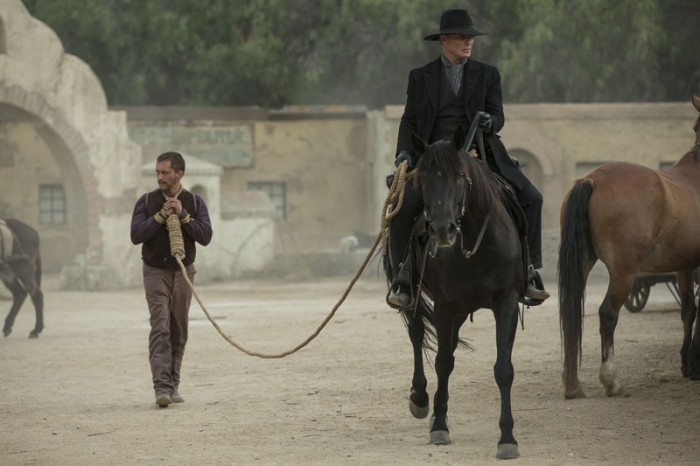
Does The Man in Black Want to Break the Game?
The video game metaphor extends to the Man in Black (Ed Harris), the veteran park-goer who is on some kind of secretive mission. Last week, some viewers wondered if this casually cruel gunslinger was actually a robot run amok, a "host" who had broken free of his programming. This week seemingly nipped that theory in the bud when Westworld head of security Ashely Stubbs (Luke Hemsworth) allowed him to continue his killing spree, emphasizing that he is allowed to do whatever he wants. If this were Disneyland, the Man in Black would be a member of Club 33. He'd be untouchable in the eyes of park operations. Whoever he is, he's a big enough deal that he's instantly recognizable to the employees at the top, the regular who has poured enough money into the park that he can quasi-literally get away with murder.
But if Westworld is a twisted amalgamation of theme park and video game conceits, the Man in Black is the Disneyland vet and the old school alpha gamer. He's been playing this game for a long time. He's jaded. He knows every in and every out. We don't know exactly what the Man in Black is up to right now, but he reminds me of the undeniably talented (and obsessive) video game speed runners who memorize every glitch and design choice in their favorite games so they can complete them as fast as possible. Once you've mastered a game, you have to make your own fun. You have to stop playing a game of immersion and start trying to break the game. Because you can.
"Chestnut" deepens the mystery of this plot, with the Man in Black being given a riddle that will supposedly lead him to the maze he's looking for. Doing so involved a bloody massacre (this is an HBO show, after all), but it also involved pushing the game in such a specific direction that one of the characters, a little girl, breaks character (glitches?) and tells him where to go next. The Man in Black isn't content to let the game guide him – he's digging through the source code and looking for whatever he's missed.
Just How Big Is Westworld?
One of the craziest ideas proposed after the series premiere last week was that Westworld is actually located on a terraformed Mars, which would explain why the park has so much space and why employees have to "rotate" home and live on the property. I'm not sure I buy this, but it's certainly a fun idea and would play into this show being set in a future so far removed from our own that all diseases have been seemingly cured.
"Chestnut" doesn't tell us anything about the park's actual location, but it does deepen the mystery. We see that the park requires visitors to take a high-speed underground train to enter and we get a better picture of the scope of the park from the entry train, which shows off a sprawling landscape that goes on as far as the eye can see. The basic structure of the park is also explained to us for the first time: the central hub and its surrounding areas are fairly straightforward, but your experience gets stranger and more intense the further you venture into the fringes. I imagine that the cannibal cult horror narrative mentioned last week is the kind of storyline you can find if you really go wandering for awhile.
Once again, the basic layout of Westworld suggests a combination of theme park and video game design. The town of Sweetwater is the central hub, the Main Street. Wander in one direction, and you'll find a level set up like a Mexican border town...or rather, you'll find a "Land" themed as a Mexican border town. Like a video game or a theme park, Westworld is still very clearly designed, offering the kind of expansive but accessible and expected options that don't come by default in the real world. When all is said and done, I would love to see a Westworld park map.
Is James Marsden Going to Die in Every Episode?
Teddy Flood (James Marsden) doesn't get much to do this week, but he does get gunned down by a loud and possibly drunk park guest just for the hell of it. It's a moment of horror and dark comedy in equal measure, awful because the violence in Westworld is disturbing and grimly hilarious because killing a robot in the middle of a crowded place just to get your rocks off is so damn immature. It is also the kind of thing a bored gamer would do while wandering around the hub level of an immersive RPG. Because James Marsden feels genetically constructed to play genial blankness in the face of true absurdity, I can't help but wonder if the show will find a new way to execute him each and every week.
But Teddy isn't the only character whose storyline this week revolves around death. After playing only a small role last week, Maeve Millay (Thandie Newton) takes center stage in "Chestnut" and she's starting to remember her past lives as other characters. Newton's work here is extraordinary without being flashy: watching her play the same pre-scripted seduction scene three times in three different ways after being reprogrammed several times is just plain fascinating and her expression of revulsion after waking up backstage and stumbling into the room where the dead robots are collected is heartbreaking. It's a balance that feels impossible. How do you play a character who is artificial, who can be adjusted and tweaked by outside forces, but who is also so well-programmed and realistic that she can feel everything a human feels? Newton finds the balance.
Do We Love Any Characters Yet?
As fascinated as I am by Westworld, as on board as I am with its various ideas and mysteries and details, I haven't fallen in love with any of the characters quite yet. Sure, I'm interested in what they're doing. I want to learn more about them. But there are few characters who arrive on screen and instantly demand my affection at this point. The series has so much on its plate, so much plot, that it hasn't had time to endear any individual characters to me, to make me understand why I should be invested in them beyond their role in the plot.
The character I'm the closest to embracing right now is Bernard Lowe, but a certain amount of that comes from Jeffrey Wright simply being a magnetic actor capable of imbuing every line of dialogue with weary intelligence. The revelation that he's in a relationship with Theresa Cullen (Sidse Babett Knudsen) is solid first step in humanizing both of them, but right now, both of them are still very much defined by their role in the park rather than by whatever is lurking inside of them.
One of the most promising characters is Jimmi Simpson's William, who has a seemingly vital role on the ground in the park. He's the moral guy in a world full of immoral humans and oblivious robots. He's as uncomfortable by the choices made by certain Westworld guests as we are. He's us. He's our avatar. Simpson makes a strong first impression in "Chestnut," but we are going to need a little more than him just being the nice guy in a den of scoundrels.
What Is Dr. Ford Planning?
While he is as draped in mystery as everyone else around him, "Chestnut" did get me very interested in learning more about Dr. Robert Ford (Anthony Hopkins), the creator of Westworld. In fact, his scenes this week couldn't help but remind me of Walt Disney. The comparisons go beyond him being an aging entertainment maestro who has developed a popular theme park. It's how he wanders into his own park all by himself just to see how things are functioning. It's how he interacts with a park employee (or rather, a boy robot) to get a handle on what is interesting or enjoyable about the Westworld experience. It's his obsessive attention to detail, how he seems as interested in the tiny nuances of design as he is in the more obvious and bombastic experiences.
If you really want to strain the Disney metaphor a little bit, look to the final scenes of the episode, where Dr. Ford firmly rejects Lee Sizemore's bloody and titillating new storyline (or is it new DLC?). After all, we just saw him wander the desert for a few hours and take pleasure in the experience of just being. Of noticing. Of watching. I'm reminded of the current divisiveness between Disney theme park fans and creatives – is damaging the immersion of a park worth it if you get a high-tech new ride? Does the carefully considered and purposeful urban design of Disneyland really matter in an age where everyone is rushing from ride to ride and line to line? Whether by accident or design, Ford versus Sizemore is a brilliant portrait of the battle over modern theme parks.
Of course, there's a lot more going on here, especially since Ford's rejection of the new storyline is accompanied by him saying that he has something new in the works. Whatever it is, it involves a mysterious black steeple in the middle of the desert. And whatever it is, it's surely a little more ambitious and strange and nuanced than whatever Sizemore and his crew have been cooking up. After all, if Ford buried secrets in his world that take 30 years to discover (see: the Man in Black), he's not going to offer anything traditional now.
Can We All Agree That This Was a Stronger Hour of Television?
"The Original" was a strong pilot and a terrific statement of purpose. It was Westworld announcing its presence with a bang, laying cards on the table, and declaring what it's about. However, "Chestnut" is a superior hour of television in every way and actual proof that this show can actually function as a television series. It's difficult to make a pilot that grabs your attention, but it's nearly impossible to create a television series that can truly sustain itself.
"Chestnut" is full of smart choices that see the show focusing on the long game. Last week's chief characters, like Teddy and Dolores, are relegated to the background as other characters step into the spotlight. More characters are introduced in tandem with new concepts. Familiar faces show new sides. Every storyline is touched upon or, at the very least, nudged. There isn't a single scene in this episode that feels unnecessary or even bloated – Westworld is moving at a fine clip and it's refusing to waste our time.
What Is the Future of Entertainment?
2016 isn't the year that virtual reality went mainstream, but it is the year that saw VR headsets really start to make their way into people's hands. You actually have a choice between several options, like the Oculus Rift, the PlayStation VR, or the HTC Vive (and more are on the way). VR isn't going to replace movies or video games, but it's a new option, a new kind of entertainment with its own unique feeling and flavor. It's exciting that this technology exists in a way that is so accessible. It's exciting that VR is finally starting to live up to the promise of what it could be.
It's also a little scary. When I play a video game, I murder without thinking twice. I decapitate and shoot and blow the limbs off my digital foes. I have a controller in my hand and I'm sitting on a couch, staring at the television. I'm removed from the violence on screen. But VR is a different beast. It places you inside the narrative. It asks you to become a character instead of just controlling a character. And I have realized that I don't think I'll ever be able to play a first-person shooter video game in virtual reality. I don't want to feel responsible for the faux death and destruction I would cause. Call me a wimp, call me a loser, but the thought of committing digital murder in an immersive environment chills me to my core.
I thought a lot about VR while watching "Chestnut." I thought about it when the various park guests executed robots for the hell of it. I thought about it when the Man in Black casually murders a robot's family because he knows he cannot actually be harmed by the repercussions. I thought about the future of entertainment in general, about how I enjoy violent movies and violent video games and how this show's peek over the science fiction horizon has exposed my personal line in the sand. These violent delights have violent ends, indeed.

